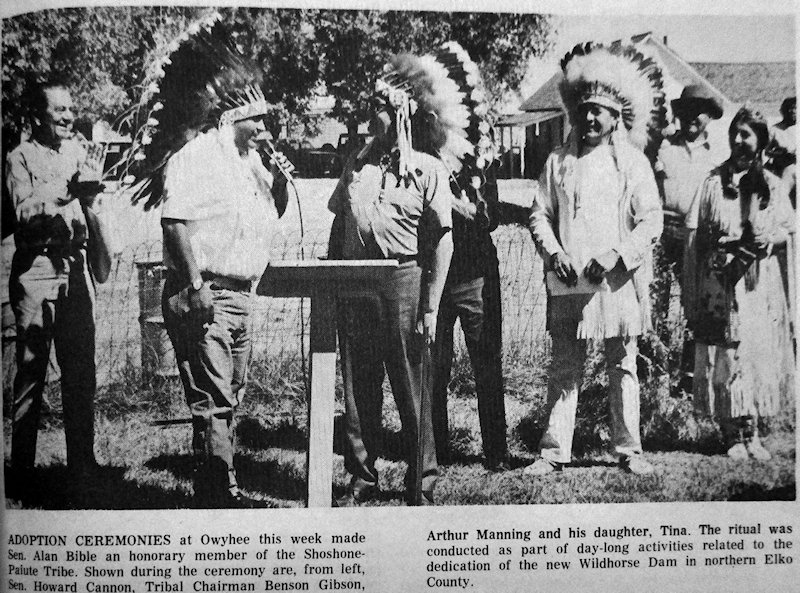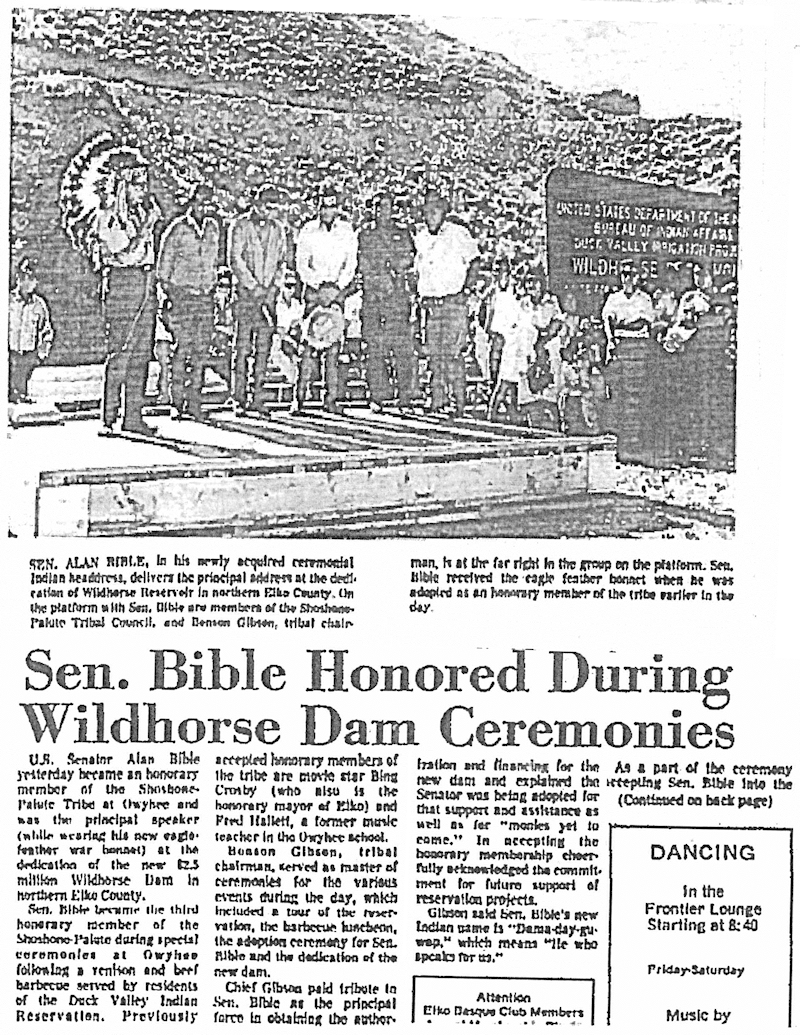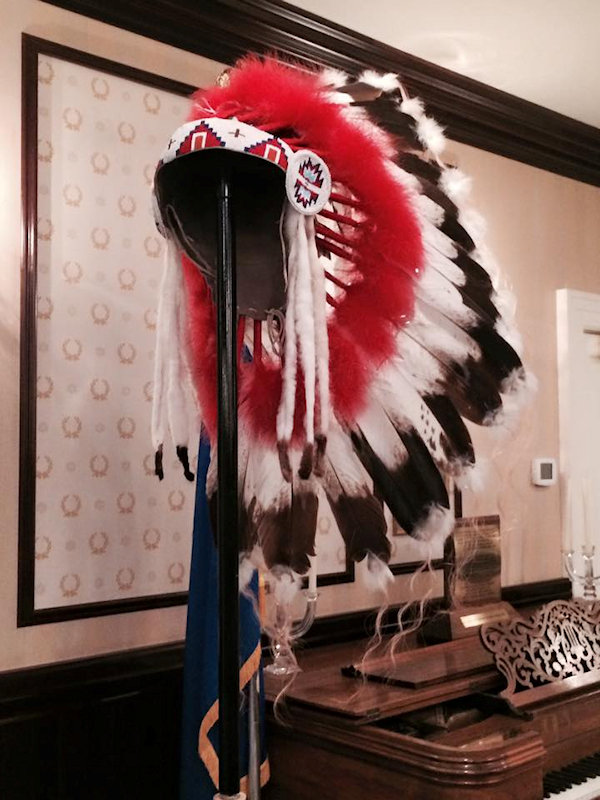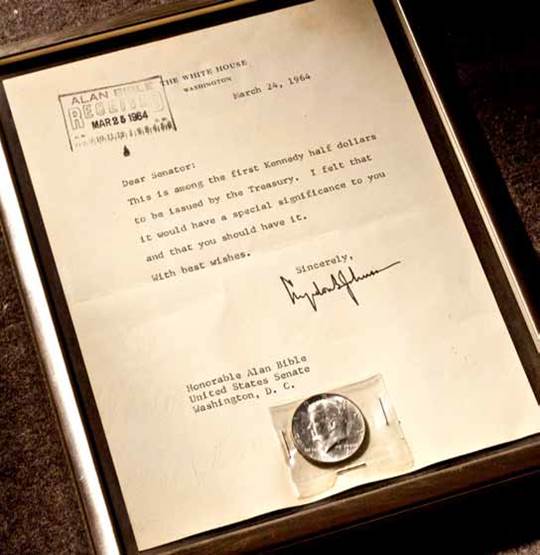20th Nevada Attorney General
Term: January 4, 1943–January 6, 1947, Elected
Term: January 6, 1947–January 8, 1951, Elected
The Nevada Attorney General’s Office extends a very special thank you to Paul A. Bible, Esq., the son of former Nevada Attorney General Alan Bible, for providing an in-person and highly-detailed account of his father.
Biography
Alan Bible, son of Jacob (“Jake”) Harvey and Isabel Welsh Bible, was born on November 20, 1909, in Lovelock, Humboldt (now Pershing) County, Nevada. He attended school in Lovelock in a two-room schoolhouse, but in 1919, after a fire destroyed the Bibles’ home and everything they had, the family moved to Fallon. Bible continued his education at Fallon Oak Park Grammar School, and in the fifth grade, he became a member of the class debating team. In 1923, Bible attended Churchill County High School; was president of the freshman and senior classes; and won the state oratorical contest in 1926.
In 1930, Bible received a bachelor’s degree in economics from the University of Nevada at Reno; a law degree from Georgetown University Law School, Washington, D.C., in 1934; and was admitted to the Nevada State Bar in 1935. While studying at Georgetown, the worsening depression forced Bible to work part-time, and it was there he met Senator Pat McCarran who gave Bible a job as an elevator operator in the Capitol Building. After graduation from law school, Bible returned to Nevada and became Senator McCarran's associate law partner.
In 1939, Bible married Loucile Jacks Shields, he adopted her daughter Debra, and he and Loucile had three sons, Paul, William, and David. Governor Richard Bryan appointed Paul chairman of the Nevada Gaming Commission and William as Director of the Budget. William managed Richard Bryan’s campaign for U.S. Senate and then became chairman of the State Gaming Control Board.
In 1935, Bible’s political career began with his appointment as District Attorney of Storey County and subsequent election to that office the following year. It was a friend of Bible’s who recommended him to then-Attorney General, Gray Mashburn, a long-time ally of McCarran and the 21st Attorney General of Nevada. Bible served as a Nevada Deputy Attorney General from 1938–1942, and in November 1942, he was elected as Nevada’s 20th Attorney General, the youngest state attorney general in the nation. Re-elected in November 1946, he served until 1951, at which time, he and his law partner, Robert L. McDonald, co-founded the law firm of McDonald Carano Wilson. During his eight years as Attorney General, Bible became the state’s leading expert in the “complicated legal field of western water rights.”[1]
In 1952, Bible ran for the United States Senate but lost in the Democratic primary by 475 votes to political newcomer Thomas B. Mechling. However, after the death of United States Senator Pat McCarran on September 28, 1954, Bible was elected to the Senate and sworn in on December 2, 1954, to fill the remaining two years of McCarran’s term. Bible was re-elected in 1956, 1962, and again in 1968. On December 15, 1974, Bible resigned his Senate seat and terminated his Senate service “before the end of the 93rd Congress so that his successor—Senator Paul Laxalt, who would sit on the other side of the Senate aisle—could be sworn in early so that “Laxalt could advance in seniority over other members of the 1974 freshman class.”[2] That was vintage Bible, more concerned about his state’s welfare than his political party.[3]
From the time Bible entered the Senate, his career revolved around water projects, mining legislation, land and resource development, parks and recreation expansion, wilderness protection, and “the fight to preserve a state veto against perceived encroachment by the federal government.”[4]
Like so many of his Senate colleagues, Bible came of age as a state official when the western states confronted a perplexing variety of postwar economic problems. More-over, Bible’s political tutelage under McCarran and his own experience in the attorney general’s office reinforced his belief that “all politics” is local. He accepted the political wisdom of his mentor [McCarran] that Nevada, and the needs of its constituents, superseded all other political or economic considerations. He learned the arts of horse-trading and compromise long before he succeeded McCarran as a U.S. Senator.[5]
Part of a Nevada political tradition is that “no state is more deficient in water resources than Nevada.”[6] Mining declined in the late 19th century, and many in the west looked for ways to free themselves from their dependence on mining . . . and pleaded with the federal government to finance water development projects to irrigate crops . . . . Bible was convinced that water was the key to economic development in arid Nevada, and “labored in support of state water rights . . . which brought federally-financed water reclamation projects to the West.” [7]
One “local” political issue involved the Colorado River Commission which was created by the Nevada Legislature in 1935. The Commission’s duties included the responsibility for securing and protecting Nevada’s rights and interests in its share of the waters of the Colorado River and in electric power generated on the river. Between 1954 and 1974, Bible was instrumental in authorizing legislation and shepherding it through, leading to the construction of the first phase of the Southern Nevada Water Project in 1965 which guaranteed Nevada’s share of Colorado River water and building pumping stations to bring additional water to Las Vegas. This water enabled the development of the Las Vegas strip. In a 1987 interview, Bible said, “[w]e didn’t think we would ever need any more water, Las Vegas was just so small.”[8]
Another water project of Bible was the Wildhorse Dam Project in northern Elko County at Owyhee, Nevada. On September 8, 1970, Bible, honored during the opening ceremonies, became the third, honorary member of the Shoshone-Paiute Tribe of the Duck Valley Reservation. Bible, adopted by the Tribe, received a new name, "Dama-day-gu-wup," which means “[h]e who speaks for us.” Then-tribal Chairman, Benson Gibson, paid tribute to Bible as the principal force in obtaining the authorization and financing for the new dam” and said that Bible “was being adopted for that support and assistance as well as for ‘monies yet to come.’”

In this picture from an Elko newspaper of the time, courtesy of the Northeastern Nevada Museum, Bible (third from left) is wearing the tribal eagle leather war bonnet presented to him by the Tribe. [9]
Bible became the third, honorary member of the tribe, joining singer Bing Crosby (the honorary mayor of Elko) and Fred Hallett, a former music teacher at the Owyhee school.
 [10]
[10]
.jpg?n=9999) [11]
[11]
 [12]
[12]War bonnet worn by Senator Alan Bible in 1970, found approximately 45 years later in the basement of the Northeastern Nevada Museum in Elko, It apparently was donated by Bible to the museum. Museum staff restored the bonnet—it will be loaned to the new Shoshone-Paiute Tribal Headquarters in Owyhee, Nevada.
Important to Bible throughout his twenty-year career as a United States senator was doing little favors for people—“I always had one guiding rule, which I hope I more or less met, and that was trying to help people,”[13] and “I got the greatest pleasure out of trying to help people . . . [t]here can be no greater reward in life.”[14]
Also known for his advocacy of national parks, Bible, in his tenure as chairman of the Interior Committee's Subcommittee on Parks and Recreation, helped create more than 86 parks, historic sites, and national monuments, including the 48,000-acre Assateague Island National Seashore in Maryland; the 23,000-acre Gateway National Recreation Area along the New York-New Jersey shoreline; the 53,000-acre Point Reyes National Park in California; the 131,983-acre Redwood National Park, including three state parks; the 684,000-acre North Cascades National Park, including two recreation areas; the 26,000-acre Cape Cod National Seashore in Massachusetts; and an expansion of the Toiyabe National Forest in Nevada. In 1986, Congress established Great Basin National Park in White Pine County, in east-central Nevada near the Utah Border—“a lasting testament to his [Bible’s] career . . . a park [he] had fought for throughout his final years in the Senate”.[15]
After the assassination of President Kennedy in 1963, Bible proposed that 50 million silver dollars be minted with the President's likeness.
 [16]
[16]1964 letter from President Lyndon Johnson to Senator Alan Bible, which includes a gift of an uncirculated Kennedy half dollar, can be found in the Alan H. Bible Senatorial Papers at UNR Knowledge Center.
Bible supported President Johnson's Great Society program as well as his Vietnam policy, however, in 1968, Bible said of the American involvement there, ‘‘[w]e have learned a lesson that we cannot police the entire world.'' According to Alan’s son, Paul Bible, President Johnson said of [Alan] Bible that he was a “work horse rather than a show horse.” Bible cast the deciding vote in the Senate to override President Nixon’s veto of the Clean Water Act. Bible also introduced the first bill passed by Congress that gave 18-year-olds the right to vote.
“Bible gave much to our nation without asking for applause. He made sure his people in Nevada were not forgotten. He commended the respect of our whole national government through his gentle manner, his hard work, and his fairness. He left a great heritage, but he never asked to be recognized for his accomplishments.”[17] According to Bible’s son, Paul, Bible received an honorary degree from the University of Nevada (now, the University of Nevada, Reno) in 1970, and in 1974, he was named a Distinguished Nevada by the University of Nevada Regents. Bible’s friend William “Wildcat” Morris and his wife Vivian created and endowed the Senator Alan Bible Teaching Excellence Award, for faculty in liberal arts and sciences in honor of Alan Bible. The endowment later was augmented by his son Paul and his late wife Judy.
Important to Bible throughout his twenty-year career as a United States senator was doing little favors for people—“I always had one guiding rule, which I hope I more or less met, and that was trying to help people . . . I got the greatest pleasure out of trying to help people . . . [t]here can be no greater reward in life.”[18] Paul Bible, Alan’s son, said that upon his father’s retirement, Senate staff presented Bible with a plaque that read: “For a man who always looks for the best in everything and everybody”.
Bible gave much to our nation without asking for applause. He made sure his people in Nevada were not forgotten. He commanded the respect of our whole national government through his gentle manner, his hard work, and his fairness. He left a great heritage, but he never asked to be recognized for his accomplishments.[19]
Mary Ellen Glass, who interviewed Bible for the University of Nevada Oral History Project (Oral History #095), said he was a highly likeable, rather self-effacing individual . . . he slides over issues, and doesn’t speak too critically of anyone. . . it was a matter of policy with him, and it became part of his political style. ‘If I can’t speak well of a person, I will not speak ill of him’.[20]
In 1974, Bible was succeeded in the Senate by Senator Paul Laxalt, confidant to President Reagan and the grandfather of the 33rd Attorney General, Adam Paul Laxalt.
Bible died on September 12, 1988, in Auburn, California, at the age of 78. At the time of his death, Bible was survived by his wife, Loucile, of Auburn, California; daughter Debra Bandini, of San Diego, California, and three sons: Paul, of Reno, Nevada; William, of Lake Tahoe, California; and David, of Santa Clara, California; and seven grandchildren. Bible is interred at the Masonic Memorial Gardens Cemetery, Reno, Nevada. Upon Bible’s death, consumer advocate Ralph Nader called Bible “one of the Senate’s most productive members.”[21]
On September 28, 1988, in the Las Vegas Sun, Hank Greenspun, an old nemesis of Bible’s from the 1952 Democratic Senate primary . . . wrote a fitting epitaph for the life and career of Alan Bible:
Alan Bible’s legacy was to let every person know that despite petty, cheap, vicious politics, a man can rise to the highest positions and win the admiration and confidence of his constituents. The only advice we can give to those who would seek a career in public life is to pattern their character after Alan Bible. If they do they will become, as he did, a public official in whom trust was not betrayed.[22]
Election of 1942 and 1946
On November 3, 1942, Bible was elected as Nevada’s 20th Attorney General, and of the 38,980 votes cast, Bible (Democrat) received 23,139 (59.4%) votes to John R. Ross’ (Republican) 15,841 (40.6%) votes. It is interesting to note that John Ross was the great-grandfather of Nevada’s 33rd Attorney General, Adam Paul Laxalt.
In the election on November 5, 1946, Bible ran unopposed and received all 32,644 votes cast.[23]
Office Administration and Duties
The Nevada Attorney General’s office budgets from July 1, 1942, through June 30, 1950, listed 24 staff for Special Assistant Attorneys General, Deputy Attorneys General, Chief Clerks and Stenographers, and additional stenographers:
1943–1944 Budget
|
$35,000
|
|
|
$10,000
|
Attorney General’s Salary
|
|
$ 7,200
|
Deputy Attorney General’s Salary
|
|
$ 6,000
|
Extra Deputy Attorney General Salary
|
|
$ 4,200
|
Chief Clerk – Stenographer
|
|
$ 3,600
|
Extra Stenographic Services
|
|
$ 500
|
Extra Clerical Help
|
|
$ 1,500
|
Traveling Expenses
|
|
$ 2,000
|
Office supplies, equipment, and incidentals, including court costs
|
|
|
For the express purpose of paying costs and expenses of prosecuting or defending impending or existing tax or other suits, no part of which shall be paid or expended for attorney fees, $10,000
|
1945–1946 Budget
|
$37,240
|
|
|
$10,000
|
Attorney General’s Salary
|
|
|
$ 7,200
|
Deputy Attorney General’s Salary
|
|
|
$ 6,000
|
Extra Deputy Attorney General Salary
|
|
|
$ 4,200
|
Chief Clerk – Stenographer
|
|
|
$ 4,140
|
Extra Stenographic Services
|
|
|
$ 500
|
Extra Clerical Help
|
|
|
$ 1,500
|
Traveling Expenses
|
|
|
$ 2,500
|
Office supplies, equipment, and incidentals, including court costs
|
|
|
|
For the express purpose of paying costs and expenses of prosecuting or defending impending or existing tax or other suits, no part of which shall be paid or expended for attorney fees, $10,000
|
|
1947–1948 Budget
|
$61,370
|
|
|
$11,200
|
Attorney General’s Salary
|
|
|
$ 9,240
|
Deputy Attorney General’s Salary
|
|
|
$ 7,920
|
Extra Deputy Attorney General Salary
|
|
|
$ 5,390
|
Chief Clerk – Stenographer
|
|
|
$ 4,620
|
Extra Stenographic Services
|
|
|
$ 500
|
Extra Clerical Help
|
|
|
$ 1,500
|
Traveling Expenses
|
|
|
$ 2,500
|
Office supplies, equipment, and incidentals, including court costs
|
|
|
$ 6,500
|
Legislative bill drafter and assistants
|
|
|
$12,000
|
Defense of the Boulder Dam suit
|
|
|
|
For the express purpose of paying costs and expenses of prosecuting or defending impending or existing tax or other suits, no part of which shall be paid or expended for attorney fees, $10,000
|
|
1949–1950 Budget
|
$57,900
|
|
|
$11,200
|
Attorney General’s Salary
|
|
|
$ 8,400
|
Deputy Attorney General’s Salary
|
|
|
$ 7,200
|
Extra Deputy Attorney General Salary
|
|
|
$12,000
|
Special Assistant Deputy Attorney General
|
|
|
$ 4,900
|
Chief Clerk – Stenographer
|
|
|
$ 4,200
|
Stenographer Salary
|
|
|
$ 500
|
Extra Clerical Help
|
|
|
$ 1,500
|
Traveling Expenses
|
|
|
$ 2,500
|
Office supplies and equipment, including court costs
|
|
|
$ 5,500
|
Legislative Fund
|
|
|
|
For the express purpose of paying costs and expenses of prosecuting or defending impending or existing tax or other suits, no part of which shall be paid or expended for attorney fees - $10,000
|
|
| |
|
|
|
|
|
|
|
Although the 1943 and 1945 State Legislatures did not add any additional duties for the Attorney General, the 1947 State Legislature added the following duties:
The Attorney General will prepare index and marginal notes for all of the acts, joint and concurrent resolutions, and memorials passed by the State Legislature. (Statutes of Nevada 1947, Chapter 11, Section 18, Page 12).
The Attorney General will “. . . prepare and assist in the preparation and amendment of legislative measures when requested or upon suggestion herein provided . . .” and; “. . . aid and assist any member of the legislature as to bills, resolutions, and measures, and drafting them into proper form, and furnishing to the member the fullest information upon all matters within the scope of the Attorney General’s Office . . . .”[24] (Statutes of Nevada 1947, Chapter 42, Inclusive, Pages 50–51).
The Attorney General “. . . shall be counsel and attorney for the Department of Highways in all actions, proceedings, and hearings. (Statutes of Nevada 1947, Chapter 240, Section 1, Page 764).
The 1949 Legislature did not add any additional duties for the Attorney General.
[1] Gary E. Elliott. 1994. Senator Alan Bible and the Politics of the New West. Reno: University of Nevada Press, Reno.
[2] Elliott, 1994, p. 207.
[3] O’Callaghan, Mike. Bible: a book for Nevadans. Las Vegas Sun, October 31, 1994.
[4] Elliott, 1994, p. xvi.
[9] Elko Daily newspaper picture, September 8, 1970, courtesy of Northeastern Nevada Museum.
[10] “Sen. Bible Honored During Wildhorse Dam Ceremonies.” Reno Gazette-Journal, September 18, 1970. Accessed December 2, 2016, https://www.newspapers.com/newspage/149227214/.
[12] https:/www.facebook.com/nnmuseum/photos. Accessed December 13, 2016.
[13] Mary Ellen Glass. University of Nevada, Oral History Archive, Alan Bible: Recollections of a Nevada Native Son. Oral History UNOHP Catalog #095, Interviewed 1977-1979, Published 1982, p. 142.
[14] Staff and Wire Reports, “Nevada Ex-Sen. Alan H. Bible; Political Force for 40 Years”. Los Angeles Times, September 14, 1988. Accessed October 13, 2016.
[16] As of November 28, 2016, the University of Nevada Reno Knowledge Center listed on its website this picture and accompanying text, which can be found in the Alan Bible Senatorial Papers at UNR Knowledge Center. Accessed November 28, 2016.
[17] U.S. Senator, Ted Stevens, State of Alaska, foreward to Senator Alan Bible and the Politics of the New West, by Gary E. Elliott, ix-x. University of Nevada Press, Reno, 1994.
[18] Nevada Ex-Sen. Alan H. Bible; Political Force for 40 Years. Los Angeles Times, September 14, 1988. Accessed online November 3, 2016.
[19] U.S. Senator, Ted Stevens, State of Alaska, foreward to Senator Alan Bible and the Politics of the New West, by Gary E. Elliott, ix-x. University of Nevada Press, Reno, 1994, x.
[20] Mary Ellen Glass, University of Nevada Oral History Project (Oral History #095). “Alan Bible: Recollection of a Nevada Native Son: The Law, Politics, the Nevada Attorney General’s Office, and the United States Senate”. Interview Date: 1977-1978; Document Date: 1982. Accessed December 13, 2016.
[21] Staff and Wire Reports, “Nevada Ex-Sen. Alan H. Bible; Political Force for 40 Years”. Los Angeles Times, September 14, 1988. Accessed October 13, 2016.
[22] Elliott, 1994, p. 207.
[23] Political History of Nevada, 2006, Page 384.
[24] NB: Although not stated, this activity was a precursor to the creation of the Legislative Counsel Bureau (LCB).